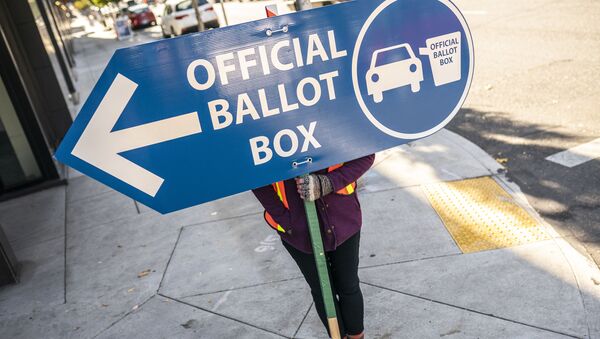Sputnik: Why do you think betting markets are more cautious than polls?
Dr Matthew Wall: Just to calibrate that question a little bit. So betting markets like kind of right now, and Real Clear Politics is a great site to follow to find out what the betting markets are doing, have Joe Biden at about 62% and Donald Trump at about 38% likelihood of winning. So they still make Joe Biden the favourite. But poll based forecasts have it more at 90% or even more for Joe Biden to win. So they're both favouring Biden, but the markets are more cautious.
And really I think that there are a few things in play there. Firstly, there's a huge scepticism about the validity of the polls. There's the kind of lesson of the Hillary Clinton/ Donald Trump campaign in 2016, where admittedly, her poll lead was slightly narrower and more volatile. But it was there and it didn't turn out to be that way on the night. And I think there's also a kind of an inclination in the Trump campaign to encourage supporters not to engage with polls, or even to deceive pollsters and the kind of scale of that effect is very difficult to quantify. And if that effect is, ultimately around four or 5%, right, that puts the polls out that much, that would make it really a much closer race, very close. And so I think that what you're seeing with the betting market fundamentally is a scepticism about the ability of polls to correctly project what's going to happen on election day.

Sputnik: How trustworthy do you think polls are?
Dr Matthew Wall: This is an interesting question. So a really interesting site that looks at these issues is a site called fivethirtyeight.com. And that's led by Nate Silver, who's just kind of at the forefront of this econometric approach. And what that site does is that it kind of rates pollsters in terms of their previous accuracy, in terms of whether they disclose where their funding for the poll comes from, in terms of whether they disclose whether the people funding the polls want to influence the methodology or the questions. And so it turns out that polls are quite variable in terms of their reliability or their methodological rigour. So he has a kind of American style, A plus to C minus, rating system. So that's something to bear in mind. When you look at an individual poll, they're all done by different agencies and they're funded by different clients.
Fundamentally, polls typically over time, are relatively reliable, you're talking about a kind of three to 5% margin of error. And the bigger problem is kind of bias really than error though. And what we have seen recently in the last few major elections, like both here in the UK, most notably, I suppose, in 2015, when the Conservatives won a surprise majority, and obviously, with Brexit that followed it, Labour was underestimated in 2017. Obviously, over in the States, you had the 2016 presidential campaign, but by and large, they tended to underestimate the more populist or more right-wing candidate or issue as it was the case with Brexit.
But on the other hand, I think pollsters have a pretty strong incentive not to make the same mistake again, so they can adjust their methodologies as they go along. I think it's at least as likely the polls are going to underestimate Joe Biden because all of the reputational risk is loaded into not calling it for Donald Trump. You know, whereas if there, you know, as Biden outperforms the polls by 5%, there, nobody's going to hold against the pollsters. Right. So I tend to think that polls are over time, a relatively robust method, but there's a lot of variability both pollster to pollster and election to election.
Sputnik: Do you think the truth only reveals itself in the ballot box?
Dr Matthew Wall: Yeah, I mean, there's a kind of political truism that the only poll that matters is the one that happens on Election Day, right? And you often see kind of embattled political leaders kind of wheeling that out when the poll numbers aren't looking good for them. Fundamentally, I mean, polling as a method can't force people to tell the truth. You can't strap a lie detector on someone for a poll. So in that sense, it is only the vote that counts. On the other hand, I think polling by and large does tell us something really useful about the state of play. I always think polling is kind of miraculous in a way and it's actually a miraculous feature of our universe that we live in, that a random smaller sample of a bigger group can tell you a lot about that group systematically through what's called inferential statistics. But polls have a tough job because they’re not just telling you the level of support, they're telling you about who's going to actually turn up and vote. So they have to, they have to adjust the numbers in quite a few ways. And that is, you know, ultimately, the problem that they face and the reason why we have the election and don't just run a series of polls, right?



